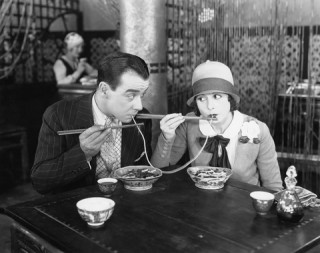With only two, possibly three, romance films – ‘Fifty Shades of Grey’, ‘Far from the Madding Crowd’, and possibly ‘Focus’ – in the UK top 50 box office in 2015 this is a look at what makes a good romance narrative, and why we might not be watching too many of them.
Romances have always been successful narratives in the cinema from ‘Brief Encounter’ to ‘Notting Hill’ and ‘Shakespeare in Love’ but recently this success seems to be on the wan. Has romance died or has something in the development of the romance genre killed off this one genre that attempts to provide some answers to our loneliness?
It is worth reflecting at this point on the difference between a romance genre and a romance story. The former is a framework within which a set of stories and other narrative elements work. The latter is an audience’s understanding of the motivation for a single character. Therefore, a romance story may occur in any genre, but within the romance genre the focus is on romance stories only. The failure to do the latter is a major reason why many attempted romances fail. The belief that because a romance story exists in a narrative it must be a romance is also a reason why many potential personal dramas and thrillers fail.
But enough of the reason why other genres do not work let us look at the key elements of the romance genre.
The primary elements are:-
- The narrative centers on a notion of love.
Love as a term is notoriously difficult to define, but one common thread which runs through most romantic narratives is a strong affection for someone or something, a desire. This desire is linked to a feeling of loneliness. Our sense of not being connected in some profound way with another person, or something which is seen to compensate for the loneliness, classically money, power etc..
It is how this loneliness is expressed, and how the love is addressed, being placed at the center of a film, book etc., which make it part of the romance genre.
- The two central characters are both involved in romance stories. If it is a triangular romance, then the third character is also involved in a romance story.
Central to any successful romance are the two, or three, central characters being in love. Unlike other genre this type of narrative requires the audience to focus on love stories. These stories dominate the plot whether it is two or three main characters. Crucially, all the other minor stories which make up the plot also focus on love. Also key here is to ensure that the nature of love being expressed is similar between the characters and the conflict which arise between them stems from their desires.
- The central protagonists have an equal narrative weight in terms of narrative time spent with them, and the level of problems they have to overcome to realise their love.
For a romance to work for an audience the audience must care equally about the two central characters, three if it is a triangular romance. In order for this to be achieved a roughly equal amount of narrative time has to be given to all the main characters. This inevitably means that some scenes and sequences only focus on one of the main characters and not the other, and that no one character dominates every scene.
This is the most radical departure from contemporary screen theory, and directly contradicts the most often asked question in development ‘Whose story is it?’
I think it is this problem which is at the heart of why romances are no longer seen on our screens not that we have fallen out of love with romances but they are not being made in the way which makes them work for us.
In this respect it is interesting that the two which make the top fifty in 2015 are both based on books. As they have already established narratives with central characters, who have their romance stories, and plot, before they are adapted to the screen, they are safe from the ‘Whose story is it?’ dissection. A pointer to the issue of the failure of genre development rather than an audience’s rejection of the romance genre.
It is also interesting that they are dramatic romances rather than romantic comedies or tragic romances but this is an issue for another blog.


